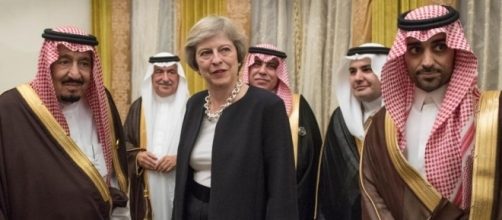As we all stand with her on our way the Titanic-calibre iceberg that is the EU leave, Prime Minister Theresa May and her Downing Street cronies have started using the term “global Britain.” May is getting excited about all the new trade deals she’s going to get in the wake of Brexit.
May is enthusiastic about branching outside Europe. She doesn’t realise how good we had it with Europe; she’s just looking forward ambitiously to the future. She envisions British exporters selling their whiskies in India, their cheeses in America, and their books in New Zealand.
A leaked government document recently revealed that the government’s overall plan is to expand trade with Britain’s 10 largest non-EU partners by 37% in 13 years, which will be quite a challenge.
May will leave no stone unturned in her quest for trade deals outside the EU
This week’s visit by May to Saudi Arabia is sure to rile some Britons, but she’s willing to try any country outside the European Union for trade in the days following the Article 50 trigger being pulled. British authorities are currently investigating Saudi’s links to war crimes committed in Yemen.
So, when May visits Saudi Arabia, she won’t just be talking their stance on Britain’s counterterrorist investigations (which they should be onboard with, given the ongoing assumption that Saudi intelligence agencies are responsible for saving hundreds of British lives); her main focus will be a closer trading bond between their two countries in the wake of the impending Brexit process.
May’s team at Downing Street have been making it clear to those who only see Saudi Arabia as the country that gave the world 9/11 that it’s also Britain’s largest economic partner in the Middle East. They shelled out £4.67 billion for British goods and £1.9 billion for British services in 2015 alone.
Free trade agreements take years to go through
However, what May might have forgotten in her excitement is that the free trade agreement she’s looking forward to forging with the Saudis will be very complicated and tricky to sort out. Brexit is two years away, and these agreements can take way more years to go through (like 10 or 15, usually), and more often than not they fall apart at the last second, so good luck, Theresa.
May hit a bump in the road when she visited India recently for exactly the same reason: to iron out a post-Brexit trade deal. But India wanted something in return, which May didn’t expect. In exchange for a lucrative agreement in India’s whisky industry, they want to expand on the number of British visas that Indian students and qualified workers have.

